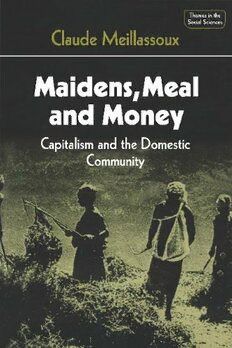
Maidens, Meal and Money PDF
208 Pages·22.752 MB·First English Language
Most books are stored in the elastic cloud where traffic is expensive. For this reason, we have a limit on daily download.
Preview Maidens, Meal and Money
Description:
For over twenty years, Claude Meillassoux has been concerned with the study of the different modes of production which existed in Africa prior to colonisation, and the ways in which they responded to colonisation. In this book Professor Meillassoux draws both on his extensive fieldwork in Africa and on the anthropological literature to provide a detailed theoretical analysis of the self-sustaining agricultural community and its articulation with capitalism through the process of colonisation. Using evidence from the usually separated disciplines of ethnology and economics, he explores the major contradiction created by the persistence within the heart of capitalism of the self-sustaining domestic community as a means of reproduction of labour power, and shows that in fact there is a logical connection between the kinship structures which control reproduction in such communities and the forms of exploitation of workers from groups dominated by imperialism. This book offers the elements both of an advanced theory of the domestic mode of production and of a radical critique of classical and structuralist anthropology. just as Professor Meillassoux's earlier work, L'Anthropologie iconomique des Gouro de C?te d'Ivoire was received as a 'turning point in the history of anthropology', this study, which goes beyond a discussion of concepts in an attempt to further the practical steps taken by Marx and Engels, represents a major contribution to the contemporary progress of historical materialism.
See more
The list of books you might like
Most books are stored in the elastic cloud where traffic is expensive. For this reason, we have a limit on daily download.
